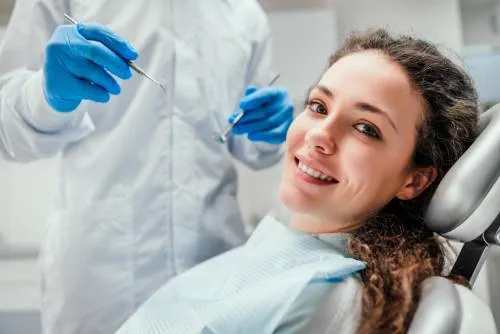Check-ups:
Lip Cancer
Cancer of the lip is a form of oral cancer that frequently gets overlooked, despite its prevalence and high recovery rate when detected early. One in 55 males and one in 108 females in the UK will be diagnosed with oral cancer in their lifetime, and between 46 and 88% of all oral, head and neck cancer cases in the UK are preventable.1
It’s never been more important to know how to spot early signs of lip cancer and other oral cancers, to be aware of how to prevent oral cancer developing, and to regularly visit a dental professional who can identify lip and other oral cancers.
Let’s take a closer look at lip cancer and learn what it is, which factors increase your risk of developing lip cancer and what to look out for.
Interested in booking a check-up?
Get in touch with your nearest Bupa practice. They can help you book a check-up and answer any queries.
What is lip cancer?
Lip cancer is a type of mouth (oral) cancer that occurs on the skin on and around the lips. Cancer of the lip can develop on both the upper and lower lip, but is more prevalent on the lower lip. Like all forms of oral cancer, lip cancer is considerably more common in males than females and is considered highly treatable when detected early
The majority of lip cancers are squamous cell carcinomas. This means that they develop in the thin, flattened cells in the outer and middle layers of skin on and around the lips. There are a number of risk factors associated with lip cancer, the most common being tobacco use and UV exposure from the sun. Simple approaches to reducing your risk of lip cancer include stopping smoking and using SPF lip creams, or simply wearing a sun hat when directly exposed to sunlight.
Lip cancer symptoms
There are many signs and symptoms associated with lip cancer, and not every individual case will exhibit all of them. However, the most common lip cancer symptoms include:
- A sore on the lip which will not heal after several weeks
- Numbness, a tingling sensation or a dull and continuous pain on the skin of the lips and around the mouth
- A slightly raised or flat discoloration (usually whitish) on or around the lip
If you have any of these signs or symptoms, make an appointment with a doctor. While there are many minor issues with similar symptoms that are not lip cancer, it’s always better to speak to a specialist.

How is lip cancer treated?
Once identified and diagnosed by a specialist, lip cancer treatments usually involve a surgical procedure for removing the cancer. For small or minor lip cancers, the surgery is likely to be a routine operation which will have a minimal impact on the way your mouth and lips appear.
For larger cancers, it may be necessary to undergo more extensive surgery. This may be followed by surgical reconstructions to ensure you can speak and eat normally, and to maintain a satisfactory appearance following your treatment.
Early detection is key to successful treatment. Your dentist or hygienist may spot signs or symptoms of lip cancer during a routine check-up. If this occurs, they will be able to refer you to a head and neck cancer specialist for a thorough diagnosis.
What causes lip cancer?
The causes of lip cancer are unknown. However, cancers develop when cells undergo mutations in the DNA.
These mutations cause the cells to begin multiplying in an uncontrollable manner and to continue living after their normal, healthy lifespan. These mutated cells form a tumour that begins to destroy healthy bodily tissue, no matter where in the body they form.
What increases your risk of lip cancer?
Your likelihood of developing lip cancer can increase if:
- You use tobacco of any kind (including cigars, pipes, chewing tobacco and cigarettes)
- Your lips are excessively exposed to UV rays in sunlight or tanning beds
- You have a weakened immune system or autoimmune issues
- You have especially fair skin
- You drink alcohol
How can I prevent lip cancer?
To reduce your risk of developing lip cancer, you can do the following:
- Quit smoking (or don’t start smoking). Tobacco smoke contains a high number of carcinogenic substances, and is a leading cause of oral cancers. Using tobacco in any way exposes the cells in your mouth and lips to dangerous chemicals linked to the development of cancer
- Regularly apply an effective sunscreen or cosmetics with an SPF of at least 30. Even if you’re not in direct sunlight, you can still be affected by UV rays. Make a habit of applying SPF sunscreen or lip balm every time you go outside during the daytime to keep your lips and skin safe
- Don’t use tanning beds. Many tanning methods involve directly exposing the skin to UV light, which is associated with an increased risk of skin cancer
- Reduce alcohol consumption. 30%2 of people with oral cancer consume alcohol excessively, which in the UK means consuming more than 21 units of alcohol per week. That’s the equivalent of 11 pints of beer or seven glasses of wine
If you think you might have lip cancer or are concerned about mouth cancer symptoms, get in touch with your local dentist as soon as possible.

^ We may record or monitor our calls.
Bupa Dental Care is a trading name of Oasis Dental Care Limited. Registered in England and Wales No: 00478127. Registered office: Bupa Dental Care, Vantage Office Park, Old Gloucester Road, Hambrook, Bristol, United Kingdom BS16 1GW.
Oasis Dental Care Limited has a number of trading names including Bupa Dental Care. Please see the list of our different trading names.


